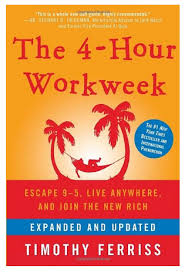I’m so grateful for this book.
It just so happens this is one of the only personal development books my family has in our house before I developed an interest in it. If not for that, I might not have read this little treasure.
Everyone’s heard of the 4-Hour Workweek. People either swear by it or say it’s a scam. And most people who say it’s a scam haven’t read it.
This book is a blueprint for the modern-day employee and entrepreneur on how to create an amazing lifestyle for yourself. The term coined in the book is “lifestyle design.” It shows you how you can reduce the number of hours you work, and shows you how to work remotely, from anywhere with Internet, even if you’re an employee!
So there are lots of actionable steps in the book. In fact, the whole book is action-based!
I’ll be up front and say I have not yet implemented the strategies of this book, but plan to do so in the future.
The first stage of the creation of lifestyle design is Definition. You must define what you want, as well as how much you need to make in order to sustain that lifestyle. This section also goes into facing fears that many people have about taking a “risk” like this.
Tim Ferriss’ technique of dealing with fear is based on stoicism: conquering fear = defining fear. Define exactly the worst-case scenario you fear, then figure out a) how likely it actually is (not very) and b) make a detailed plan on how to rebound from it.
There’ also a great quote about decision-making that I’d like to repeat here:
“To develop an uncommon lifestyle, you need to develop the uncommon habit of making decisions.”
The second part of the book is Elimination. This deals with cutting the fat off your work days. And trust me there is a lot.
How much time do you spend on e-mail per day? How much actual productive, important work do you actually get done?
Exactly. We’re all guilty.
This chapter goes in depth on how to reduce the time you spend on e-mails, such as only checking it twice a day and setting up auto-responders. It also introduces fundamental productivity concepts, such as the 80/20 Principle and Parkinson’s Law.
The 80/20 Principle is based on the finding that often 20% of a given thing produces 80% of the results. The trick is finding and concentrating all your ressources on that 20% and minimizing the time spent with the other 80.
Parkinson’s Law is as follows: Tasks tend to swell in perceived importance and complexity in relation to the time allotted for its completion. So try to give yourself less time to do tasks, as that will force you to take massive action and be much more efficient.
Use the 80/20 Principle and Parkinson’s Law in sync for best results!
Remember: lack of time is just a lack of priorities.
The third part is Automation. This really blew my mind.
It’s all about how you can automate most of the mundane tasks of working at, running, or starting a business by outsourcing it!
This was something I was completely unfamiliar with, but the 4-Hour Workweek really opened my eyes to what’s possible in this area.
For example, you can have virtual assistants in India manage your inbox and only send you reports of the most important things. Or you can have them do SEO, or market research, or even design a friggin’ business plan for a fraction of the cost of a Harvard MBA!
Yeah, pretty groundbreaking.
This section also goes into how to develop, test, and market different products that provide you with passive income to finance your dream.
The last step is Liberation. This is when you bite the bullet, go virtual, go mobile, and live your dream life.
What I loved about this book was it was super action-packed. It also provided plenty of ressources at the end of every chapter, including other books to read on entrepreneurship and similar topics. Know where I get these pictures from? Yep.
Keep in mind that yes, this book is the best thing I’ve found so far in terms of the how-to’s of online business and lifestyle design. But no book can tell you exactly which day-to-day steps you will need to take. That’s for you to figure out on your own.
I also found this book has good advice not only related to business, but also in everyday life, such as not shitting where you eat (meaning don’t work and sleep in the same room, or you’ll never be able to turn off).
One thing about this type of book: it is uber-rational. I wouldn’t take Tim Ferriss’ advice for spiritual growth: he says that once you free up time, a void and depression comes along with it, so you must fill it with other activities. This is true for most people, but for people who are serious about personal development, this void might be your best friend.
This book had a huge impact on me, and I’m so glad I read it when I did. It’s opened up a whole new world of possibilities in terms of my future. I’m seriously considering taking a gap year, creating an online business, and seeing what happens from there.
The Verdict:
The essential handbook for anyone wishing to design his/her dream life. Period.
Favorite quote:
“Fortune favors the bold.”

